When I first started this blog, there were really only three people whose food writing I read consistently – Molly Wizenburg’s (Orangette), Luisa Weiss’ (The Wednesday Chef) and Rachel Roddy’s (Rachel Eats). Whether they were writing about braised artichokes, or ham-bone soup, or a meringue cake gone to hell, their prose seemed effortless and fluid, heartfelt, but never saccharine. In a sea of food-related sites getting louder by the minute, they quickly became a special trifecta to me. I liked that food was at the centre of their writing, but not its singular purpose. I also liked that they never fetishised food, a welcomed shift from the norm, where the entire culinary world – in print, online, in restaurants – seemed to be suffering from a severe bout of excess, obsessed with everything from molecular gastronomy and celebrity chefs, to cronuts and the latest trends in bacon.
Thankfully, Molly, Luisa and Rachel were there to balance things out. By making the story the priority – instead of food trends and culinary styling – they completely changed the way I saw food media. In fact, their writing and approach to food was the reason I started this blog, and the reason I still keep plugging away at it, four and a half years after fumbling through that first post.
I tried to remember all this in April, when I spent an entire lunch break with my finger hovering over the “send” button to sign up for this year’s edition of The Language of Food, a writing workshop led by two members of the trifecta – Rachel and Luisa – at the Anna Tasca Lanza Cooking School in Sicily. The workshop dovetailed so flawlessly with the things I loved most – food writing, cooking, edible gardens, Italy – it felt like it had been plucked from a dream. I had savings set aside and vacation time banked at work. I could go. There was nothing stopping me. But there was still a small voice at the back of my head that rumbled each time I’d entertain the idea of going. Should I really be taking this workshop? Can I justify doing this? What if my writing is terrible? What if Rachel and Luisa think I’m terrible?
Finally, on that lunch break in April, I got a grip and pressed “send”.
I can’t tell you how thankful I am for that moment.
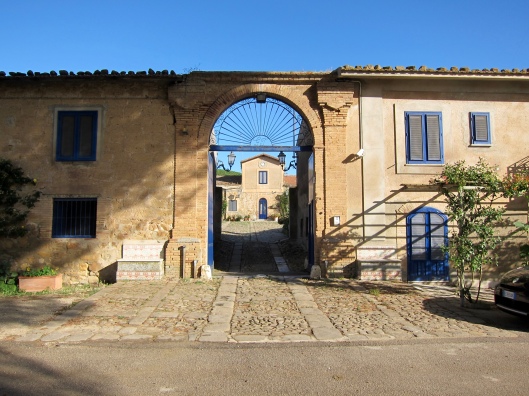
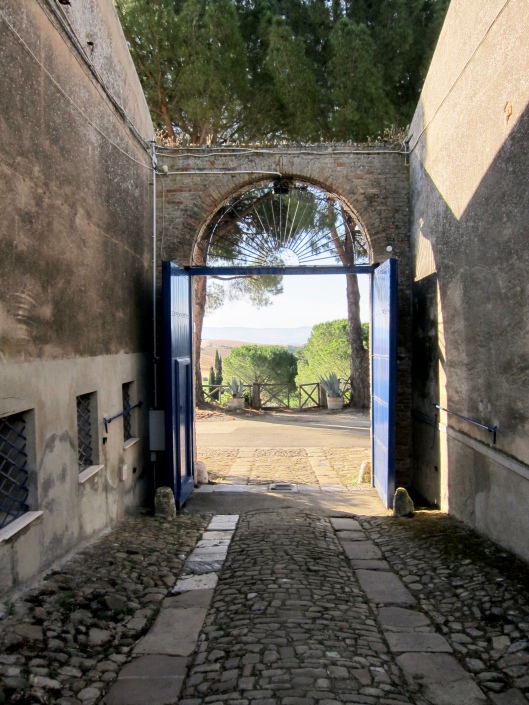
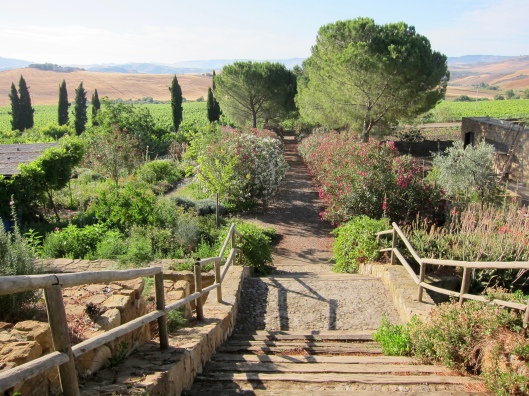
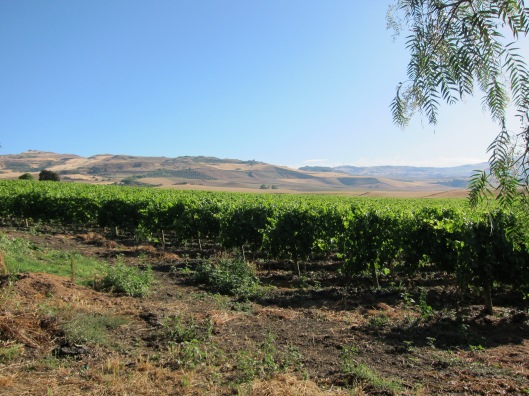
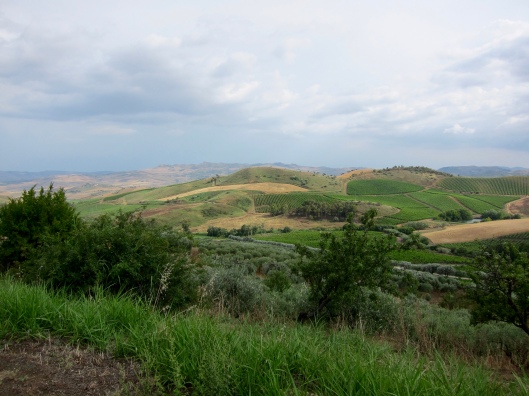
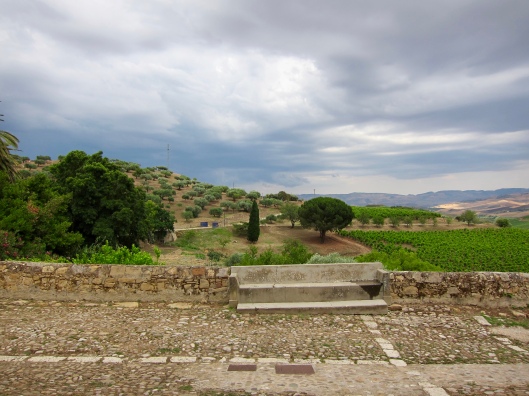
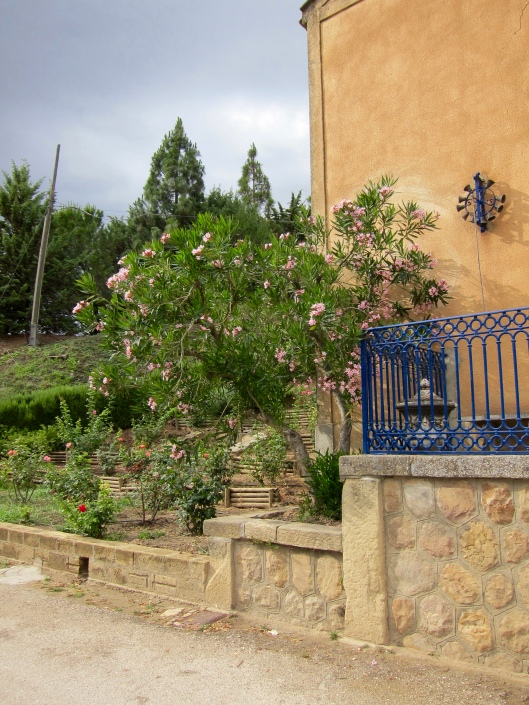
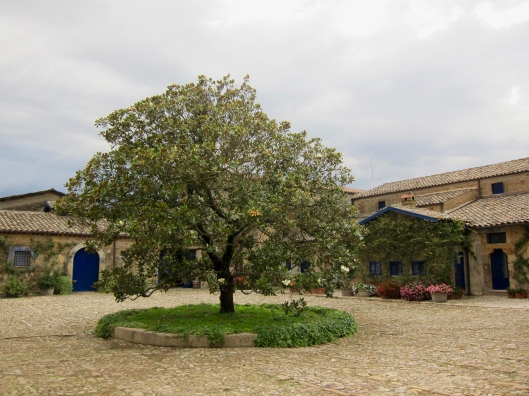
I arrived at the school in late June, after four days in Rome and one week in and around Palermo. Housed on the part of the property referred to as Case Vecchie, the school is run by Fabrizia Lanza, teacher, educator, and all-round force of nature who has become one of region’s most important proponents and protectors of Sicilian traditions, sustainable agriculture, and farm-to-table (or as she would call it, arm–to-table) living. I knew this woman was a phenom – that the breadth of what she’d taken on at her family’s estate was remarkable – but once meeting her, I also discovered that behind the illustrious persona was an exceedingly affable, delightful, lively woman who could put you in stiches with one wry, off-the-cuff comment. Knowing that she was going to be part of this week-long experience made me feel all the more lucky.
Throughout the first day, members of the workshop trickled in, some arriving from the UK, others from Berlin and the States, one originally from Victoria, BC, via Florence. We were a small group, nine in all, including Rachel and Luisa, a mix of former editors and journalists, published writers, and entrepreneurs. There seemed to be a collective giddiness about being there, all of us drawn to this one place, miles from home. It’s never a given that you’re going to get along with a group of strangers, especially when you teeter more toward introversion than extroversion, but it wasn’t long before I knew I was going to like our motley little crew. Nine women; nine eager souls, ready to soak it all in.
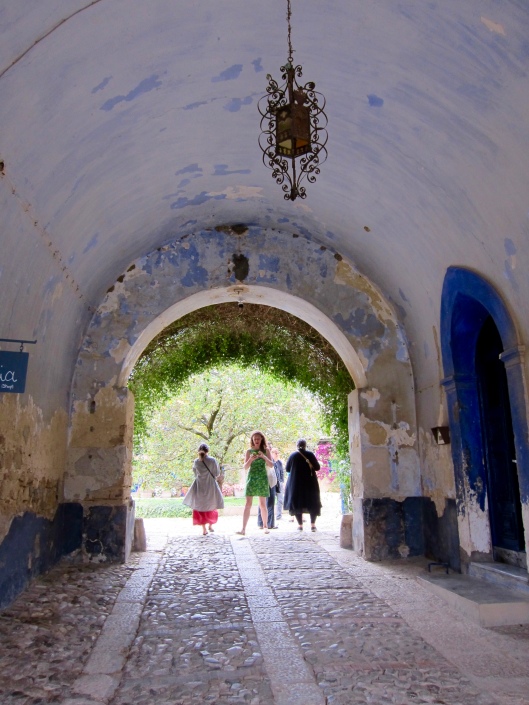
Over the course of the week, we read together, wrote together, and ate together; we chatted, strolled, exchanged stories, and wandered through the narrow paths of the garden, rubbing leaves between our fingers and lifting them to our noses; we visited the local shepherd and cheesemaker – Filippo – and watched him sculpt sheep’s milk into soft mounds of tuma – fresh, unsalted cheese made from the curds after they separate from the whey – before sitting down to a breakfast of homemade bread and jams and pecorino cheese.
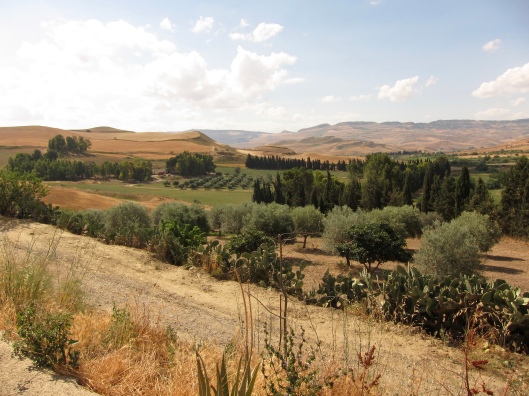
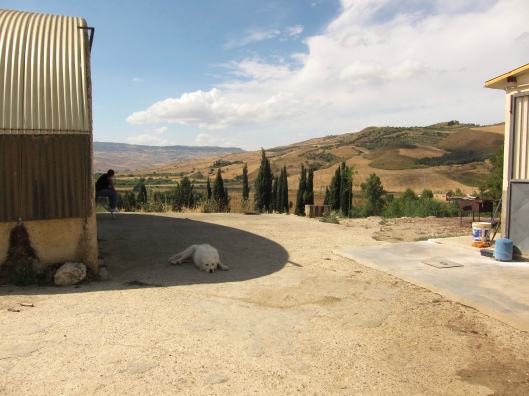
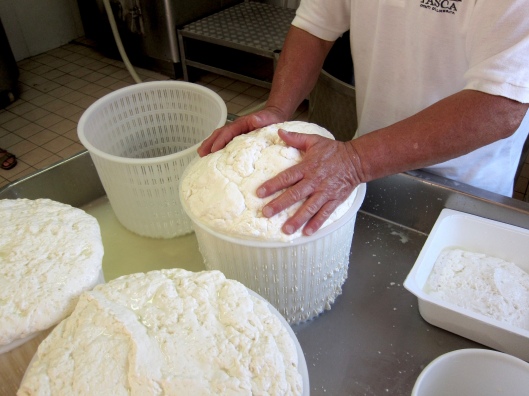
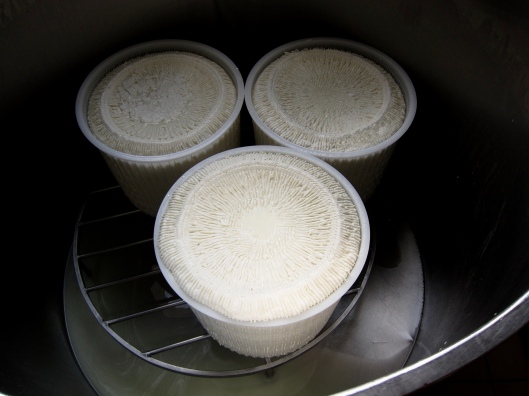
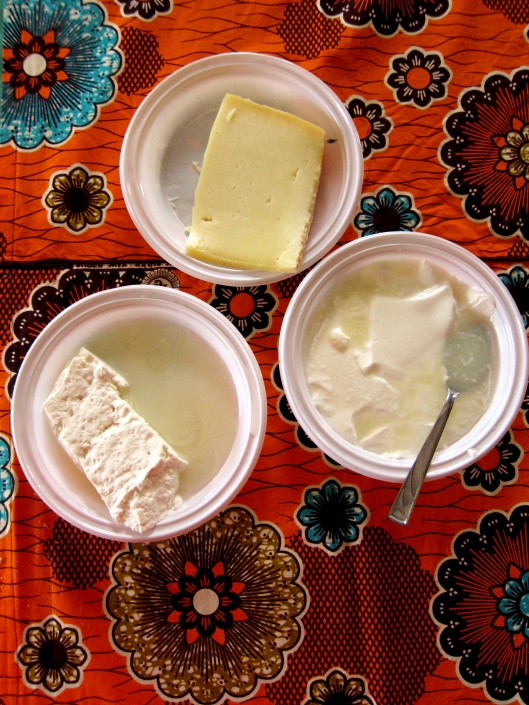
Between writing sessions, we explored the grounds, collecting vegetables from the garden and fruit from the small orchard to use in cooking lessons with Fabrizia, where we made ricotta gnocchi, ravioli, cavatelli, caponata, and sweets like sour cherry cake and cassata, a Sicilian dessert made with whipped ricotta, homemade marzipan, sponge cake and candied fruit.
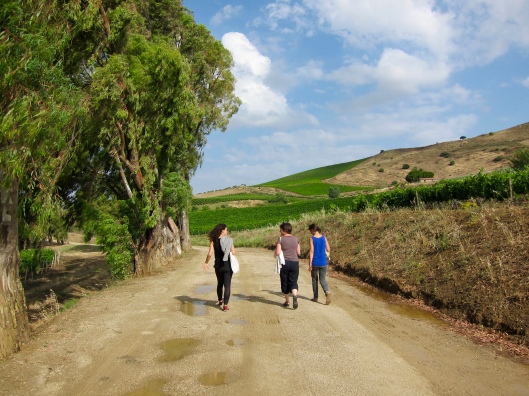
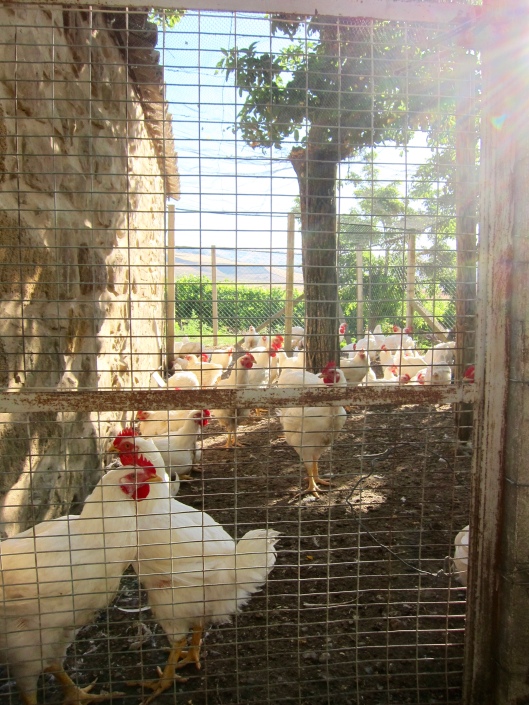
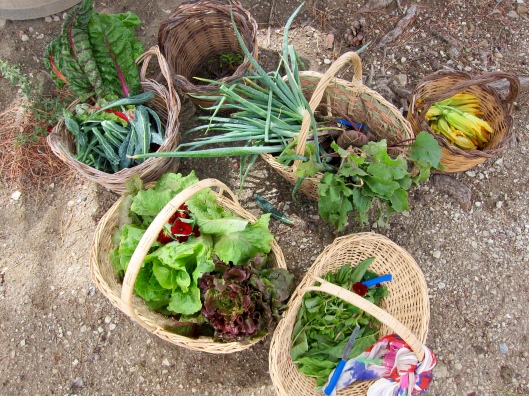
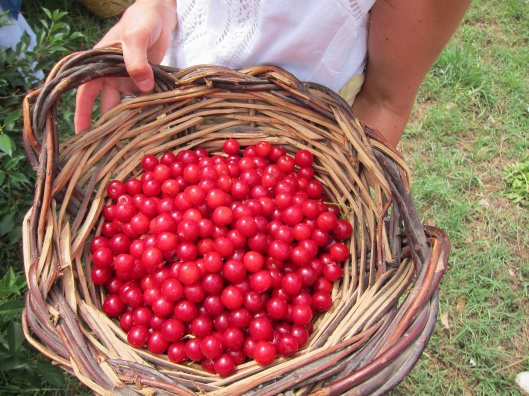
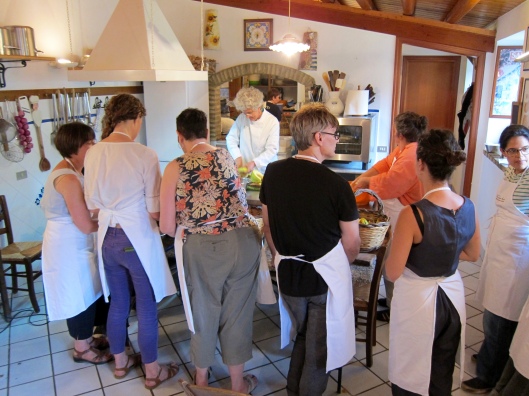
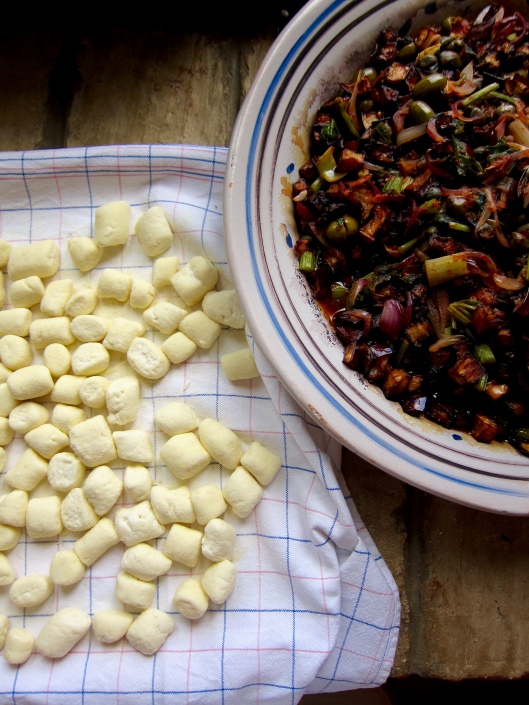
In the early evenings, at aperitivo hour, we’d gather around a table in the courtyard for platefuls of fried zucchini flowers, panelle, and cool glasses of sparkling wine, before convening around the dining table, usually adorned (to our collective delight) with one of Fabrizia’s vibrant wax print tablecloths.
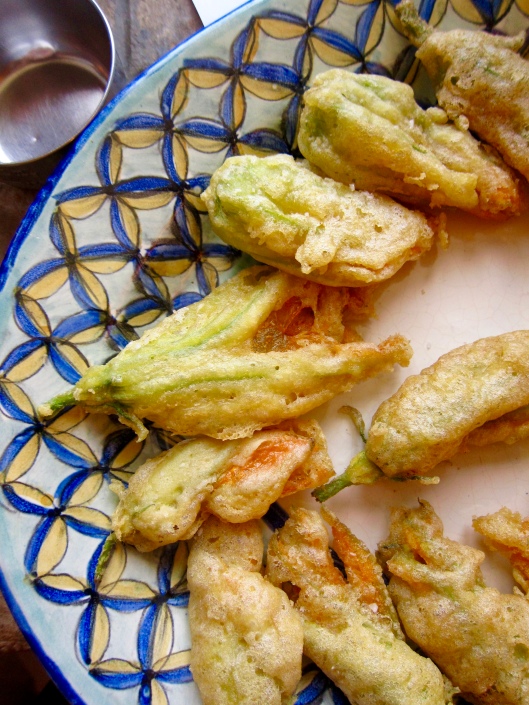
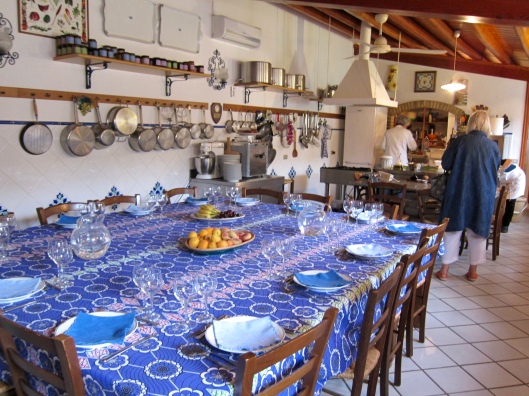
The writing sessions were spaced out throughout each day. Often we’d sit around a big glass table, under the shade in the courtyard, or at the big wooden table in the library and read pieces selected by Rachel and Luisa – M.F.K Fisher, Molly O’Neil, Julian Barnes – before dicussing and then writing, pen to paper (not laptop).
I’d be lying if I said I wasn’t jittery at the start. The day I read my first piece aloud, my voice quivered so fiercely I wasn’t sure I’d be able to make it through to the end. The next few times, I felt that my writing was shit. Just total shit. Sometimes I shared, sometimes I didn’t. In a message to my boyfriend back home, I remember referring to it as paint-splatter writing – a mess of words thrown onto the page, without coherance, structure, or good diction. I felt embarrassed and ashamed that I’d come all this way and I wasn’t able to produce anything decent. You’re here with Rachel Roddy and Luisa Weiss! You’re in the middle of the Sicilian countryside! You’re surrounded by incredible, inspiring people! Write, goddammit! Write! But something inside me froze. I was like a deer in the headlights, incapable of letting the pen move across the page without inturrupting every second word.
It was only after a conversation with Rachel, about two days in, that I realised how much I was holding myself back, how being wracked with self-doubt was sabotaging my writing and, ultimately, the experience. I spent the rest of the week trying to quell those doubts, letting whatever came out to come out, without (too much) judgment or second-guessing. What emerged was the piece on street food in Sferracavallo that I slipped in at the end of my post on Palermo (scroll down to the last story here). Was it perfect? No. Was it complete? Not quite. But it was at least something – pieces of a puzzle that could be reworked, rearranged and smoothed out. It was perhaps the only piece that I approached with complete abandon and, lo and behold, it yielded results. I try to remind myself of that when I freeze up in front of a blank page (like, say, when I sat down to write this post).
This workshop taught me, amongst many other things, that writing – good writing – takes massive amounts of perseverance. It isn’t the kind of thing that falls into your lap through divine intervention. You can have ideas, thoughts, limitless sources of inspiration, but they remain disparate pieces until you choose to weave them together with words. And even then, those words will need your time and effort to become something beyond “paint splatter”, something that will make sense, set a tone, convey a story, and resonate with the reader.
To persevere, however, writers – amateur or otherwise – need to learn to cast aside their doubts. I never realised the extent to which my self-doubt was crippling my ability to write, and it was only in doing the workshop that it came into clear focus. I’ve started to apply an attitude of “get over yourself and get on with it” in moments when I catch myself hemming and hawing over a piece of writing. And I can tell you, adopting that attitude has been imperative in getting things onto the page. I definitely have Rachel and Luisa to thank for that.
In the process, I also learnt that when you’re feeling self-conscious about the work that you’ve done, there will always be people who’ll have more faith in your abilities than you do. I’m realising how imporant it is to listen to them, to trust their sincerity. They can sometimes see the good parts of yourself that you might not, at least in the moment, because they’re clouded in doubt. In other words, let them bolster you so that you can eventually bolster yourself.
When I try to write and then falter, I think about the things Rachel and Luisa taught us – about being daring, about being self-aware, about making the time to work on your writing whenever and however you can. I also think about something Fabrizia said at our last round-table, when we were discussing the workshop experience, including our initial apprehensions. She sat with us, listening and sketching watercolour zucchini flowers, before pausing to say, “But why all this fear? I don’t understand. Why?”
She was more or less saying, why let fear stop you? Why give it space? And she had a point. There’s no room for fear when there’s so much else to let in.
—–
Big love to Rachel, Luisa, Fabrizia, and all the women of The Language of Food 2016. You are such wickedly smart, funny, warm human beings. If I could do it all over again, I would. A hundred times. x
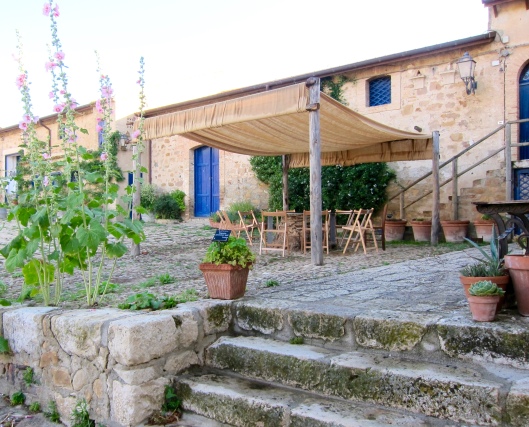


Julia,
We all have moments of self-doubt and depreciation but recognizing the situation and working around it shows what you’re made of. I’m so happy for you that you persevered at the school and took full advantage of your decision to make this trip to Case Vecchie, a trip of discovery that you will certainly remember for a lifetime. Kudos to you, I would never have the courage to travel overseas by myself as you so often do … I’m very proud of you!
Love
Dad
Aw, thanks Dad. “Travel overseas (….) as you so often do” makes me sound so jet-set. Ha. Love it!
One day you’re going to have to take your motorcycle to Italy and drive along one of the coastlines… xo
What an honest, funny and heartfelt post Julia.
You have an ease, and a warmth in your writing that I really enjoy. I was with you all the way when I read this.
It’s liberating to have a moment like you had talking with Rachel. A moment of clarity. You are so right, perseverance is the key. Having just spent 3 days at the Kingston Writers Festival, I can assure you that even Pulitzer Prize winners have moments of ‘what am I doing?”, or ‘this is lousy’. Emma Donahue said something to the effect that writing is write, edit, trash, write again, trash, write again and so on.
Thanks for being vulnerable and sharing that experience.
And may I say that your photos are gorgeous and match your writing.
xo
Thank you for the kind words, Yvonne. It definitely was an eye-opening week. More than I could have imagined. It was also encouraging to hear that even for experienced, published writers, self-doubt still manages to sneak in at times. As you say, the writing process is definitely a lot of write, edit, trash, write again, etc.
I recently read Stephen King’s “On Writing” in which one of his pieces of advice is to “kill your darlings” – in other words, learn to nix the parts that don’t work, even if you’ve grown attached to them. That one really stuck with me, along with all the bits I learnt from Rachel and Luisa. They were (and are) such incredible mentors.
Thanks for checking in. So glad to hear you’re still enjoying this space x
Very well written, fairplay to you like we say here… And the photos are amazing. I am invited for a wedding in Italy next June, it will be the first time for me: can’t wait now! 🙂
Mille mercis, Franck : ). Fun to hear that you’ll be visiting Italy soon. You’re going to fall head over heels – j’en suis sûr! Which region will you be visiting?
I am going in and around Turin. My friend Martina did the UNISG in Palenzo, university of gastronomic sciences and was an intern for three months with me. It should be pretty special 🙂
Oh, nice! The furthest north I’ve been is Bologna, but will be looking forward to hearing about your time in Turin 🙂
I’ve had my eye on that UNISG program. Looks incredible…
I need to gear myself up for it. My mind really wants to go, my anxiety prevents me to have fun and travel outside a certain zone… I will do my best though 🙂
I was in Case Vecchie in late October 2015 for a week of classes about olive oil with Fabrizzia and Nancy Harmon Jenkins. It was a marvellous experience. Looking at your pictures and reading your post brought it all rushing back to me. I can smell the air again.
So happy to hear it, Milena. I bet the classes on olive oil were fantastic. Case Vecchie is indeed a very special place. I think we all leave with a little piece of it : )
Thanks for stopping by the blog!
Fantastic piece. So glad to have found your blog! I was at ATL in June for a workshop with Maira Kalman. It was all you said and more. Dream-like, amazing.
Hello there! So lovely to have you here. I heard that the Maira Kalman workshop was incredible. And yes, “dream-like” is the best way to qualify ATL and Case Vecchie. That place is like Narnia.
Thank you for the sweet words. Check in again soon!
yes Julia, so brilliantly put – and just how was feeling too. Funny really because all the while I thought it was just me, and all the while I was thinking how brilliant you were x
Hello, Anja! So nice to hear from you! And yes – it’s funny how that little twist in perception happens. I really do feel lucky to have spent time with all of you – such an ace group of people, with top-notch talents in writing and beyond. I’ll never look at a slab of tofu the same way because of you : ) Big love, x
What a pleasure to read this, through the lense of where you are now. This is big on my dream to do list, and I loved seeing it through your eyes.
Hi there Gabrielle. Just getting this now, as I haven’t been very active on the blog. If you can, you should definitely do the food writing workshop with Rachel and Luisa. It was a phenomenal week, and Fabrizia is a fantastic host. Be well, Julia.
A wonderful read and beautiful photos. I miss Case Vecchie!
Hi Julia,
How pleased I am to have discovered this post. I am currently in Palermo about to embark on this week long food and writing course with Rachel (i think numbers are down so im not sure if Luisa is going to make it).
And, like you I had many moments of ‘should I, shouldnt I?’ before signing up and moments of ‘i must be crazy!’ especially during the 2.5 days of travelling it took me to get here from New Zealand. I know confidence & fear is also going to be a major factor for me to get over but, reading your post has given me a lot more reassurance & hope that this is going to be a wonderful week. So, thank you!
I also really enjoyed reading your post about your time in Sferracavallo. (Good on you for persuing the Sicilian public transportation system or lack thereof!). After feeling a little disillusioned with the food in the restaurants’ here you helped me remember its seeking out & working with beautiful produce that I love, especially here in Sicily. So for the rest of my trip i will be staying in accomm with a kitchen & a small terrace preferbly with a view.
Thanks again,
Kristin
Hi there, Kristin! I’m just seeing your message now, as I haven’t been very active on the blog over the last year or so…
Very glad to hear that you decided to do the workshop with Rachel. She wonderful, as is Fabrizia.
Hope you had a nice time in Sicily. Be well, eat well. Julia